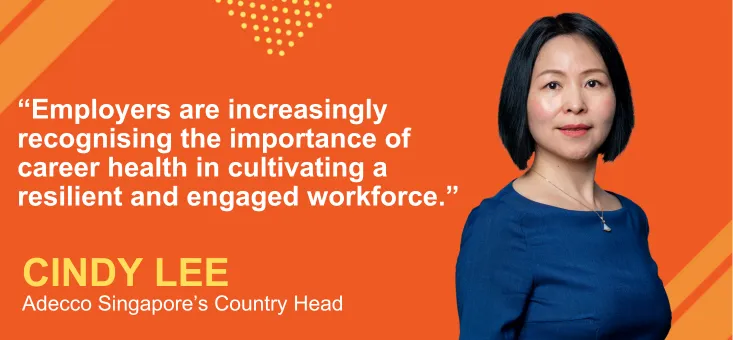In your experience, is career health something that workers, jobseekers and employers give enough thought and planning for?
Career health is a crucial yet frequently overlooked aspect by workers and employers, particularly in Singapore’s fast-paced and ever-changing job market.
Workers and jobseekers often prioritise securing their next job quickly over building a long-term career strategy.
This focus is often driven by the need for financial stability or navigating job transitions, leaving little time to reflect on skills development, research market trends, or plan for career progression.
With industries undergoing rapid transformation due to technology and globalisation, maintaining competitiveness requires consistent upskilling and networking to ensure one’s future security.
At Adecco, we have noticed a gradual shift in how individuals perceive and value career health in our daily conversations with our client and candidate networks.
Employers are increasingly recognising the importance of career health in cultivating a resilient and engaged workforce.
While not all organisations have the resources to implement comprehensive programs that support employees’ long-term growth, we do notice increasing awareness and efforts, such as building a career pathway or providing opportunities for employees to take on innovative projects to enhance their skills and encourage collaboration with colleagues across countries.
Companies that invest in career planning resources, training, and development opportunities often see better retention rates and enhanced competitiveness.
While awareness of career health is growing, and both individuals and employers are starting to adopt more strategic approaches, there is still room for improvement in integrating long-term career health planning into workforce practices at every level.
With the advent of AI, coupled with technology, industry, market and geopolitical shifts all happening simultaneously, what do you think are the key pillars of career planning that Singaporeans need to note?
Career planning in today’s fast-changing world, especially with the advent of AI, requires a holistic approach.
Some key pillars of career planning include embracing AI, lifelong learning and upskilling, innovation and agility.
Singaporeans have an excellent opportunity to leverage AI as a valuable resource to aid career development and streamline repetitive tasks, which allows increased focus on high-value activities, thereby increasing productivity and job satisfaction.
For example, using AI-powered project management tools can help employees manage their time effectively, while virtual assistants can reduce administrative burdens.
Additionally, employers can utilise AI to provide personalised learning paths through platforms that recommend courses or training programs based on an employee’s current skills and career aspirations.
By integrating AI into workforce development strategies, employers equip their teams for future challenges and build a culture of continuous learning and growth, which ultimately drives innovation and retention.
Whilst everyone speaks about the use of AI, not everyone knows how to maximise its usage.
Lifelong learning and upskilling in picking up such new technology or embracing opportunities by working on additional projects helps individuals enhance in-demand soft skills such as innovation, critical thinking, communication and adaptability.
In terms of job descriptions (JDs) from employers, what are the key new traits, skills, and aspects that have started to show in recent times that you think workers and jobseekers need to begin actively upskilling and reskilling for?
Employers today prioritise soft skills like effective communication, strategic thinking, teamwork, and collaboration as essential traits in their hiring process.
These skills foster a cohesive work environment and play a crucial role in achieving long-term business goals.
Employees with strong, soft skills can drive innovation, overcome challenges, and contribute to a culture of success.
At the same time, digitalisation has also become vital in the fast-paced job market.
Employers are seeking candidates who can adapt to and leverage technology to boost productivity and efficiency.
Proficiency in digital tools, such as data analytics and collaboration platforms, enhances decision-making and streamlines workflows.
All in all, an ideal candidate possesses both strong interpersonal skills and technological competence.
This balance is essential for fostering resilience, enabling innovation, and maintaining competitiveness in a rapidly evolving global economy.
2025: what do you think the broader career outlook for Singaporeans will be, which industry will be hiring, and for what sort of roles?
As we move towards 2025, soft and technological skills will remain crucial for long-term business success.
The government’s focus on innovation, sustainability, and digitalisation will continue to fuel the demand for skilled talent and newly created roles across various industries.
Green roles such as sustainability manager, environmental infrastructure engineer and energy consultant will be in demand.
At the same time, Singapore’s ageing population will continue to spur growth in healthcare and pharmaceuticals, such as patient care, medical innovation, and biotechnology.
The fintech sector will also expand, offering positions in areas like regulatory compliance, digital financial services, and wealth management.
In conclusion, Singapore’s career landscape will continue to grow and evolve, with new job opportunities emerging and numerous roles still waiting to be filled. To thrive in this dynamic environment, individuals must embrace upskilling and build professional connections. Discover the new employment trends happening in Singapore!
This article was done in collaboration with Adecco.















